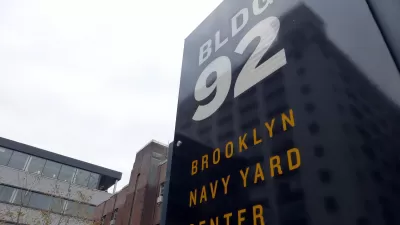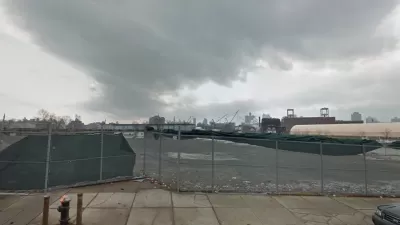Tom Vanderbilt argues that manufacturing will never disappear from our cities, because the creative class will always seek small-scale industry to make their ideas a reality.
Vanderbilt spent some time researching the disappearing garment industry in New York for the Design Trust for Public Space, and he realized that the garment industry will continue in the city despite the rash of closings.
He writes:
"It has become fashionable, in part due to the tireless work of urban studies theorist Richard Florida, author of The Rise of the Creative Class (2002) and Who's Your City? (2008), to think of cities as big idea labs-creativity skunkworks-where, in science writer Matt Ridley's infectious phrase, "ideas have sex." Often, perhaps in reaction to decades of prophecies of urban decline, this theorizing takes on the zeal of a crusade. You'd be forgiven for thinking no idea has ever been hatched outside a metropolis. While not incorrect, this theory is incomplete. Yes, cities are filled with the modern-day equivalent of the luftmenschen (literally, people who "lived on air"), creatives who breathe WiFi. But in many sectors of the "creative industry," there comes a point when something physical must be made, and when, because of financial or time constraints, it makes sense to have it produced locally."
FULL STORY: Long Live the Industrial City

Planetizen Federal Action Tracker
A weekly monitor of how Trump’s orders and actions are impacting planners and planning in America.

Maui's Vacation Rental Debate Turns Ugly
Verbal attacks, misinformation campaigns and fistfights plague a high-stakes debate to convert thousands of vacation rentals into long-term housing.

Restaurant Patios Were a Pandemic Win — Why Were They so Hard to Keep?
Social distancing requirements and changes in travel patterns prompted cities to pilot new uses for street and sidewalk space. Then it got complicated.

In California Battle of Housing vs. Environment, Housing Just Won
A new state law significantly limits the power of CEQA, an environmental review law that served as a powerful tool for blocking new development.

Boulder Eliminates Parking Minimums Citywide
Officials estimate the cost of building a single underground parking space at up to $100,000.

Orange County, Florida Adopts Largest US “Sprawl Repair” Code
The ‘Orange Code’ seeks to rectify decades of sprawl-inducing, car-oriented development.
Urban Design for Planners 1: Software Tools
This six-course series explores essential urban design concepts using open source software and equips planners with the tools they need to participate fully in the urban design process.
Planning for Universal Design
Learn the tools for implementing Universal Design in planning regulations.
Heyer Gruel & Associates PA
JM Goldson LLC
Custer County Colorado
City of Camden Redevelopment Agency
City of Astoria
Transportation Research & Education Center (TREC) at Portland State University
Jefferson Parish Government
Camden Redevelopment Agency
City of Claremont




























